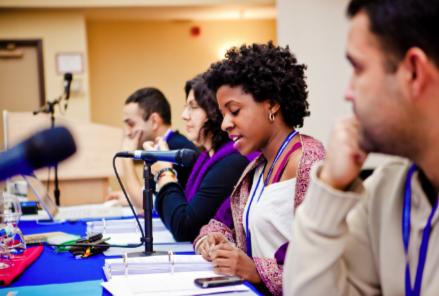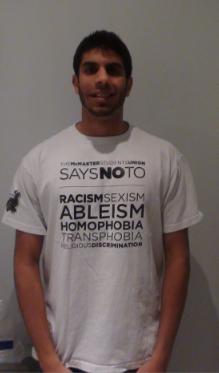
CFS Ontario chairperson Sandy Hudson (centre) says the CBS ban is discriminatory. Credit: Monirul Pathan
The Canadian Blood Service’s contentious gay blood ban has tugged on the heartstrings of students at Hamilton’s McMaster University who are now trying to rally campus support to join a national protest campaign.
During a routine CBS blood drive on campus last fall, several gay students went public after they were not allowed to donate blood.
The ensuing controversy has divided the university’s student union and its board. On one side are those who want to join the Canadian Federation of Students’ (CFS) and its End the Ban campaign; on the other are those who want to maintain a close relationship with CBS and continue to hold blood drives.
Riaz Sayani-Mulji, acting operations commissioner for the McMaster Students Union’s (MSU) Student Representative Assembly, first submitted a motion last year to endorse and participate in the CFS campaign.
He says the MSU board delayed the motion because members thought the campaign could violate the university’s partnership agreement with CBS.
Eighty-seven post-secondary institutions across Canada, representing more than 600,000 students, have endorsed the campaign, which has teamed with the Canadian AIDS Society and EGALE, says Sandy Hudson, Ontario CFS chairperson.
Hudson notes that most institutions have maintained relationships with CBS after joining.
The campaign’s mission statement calls on the Ministry of Health, CBS and Héma-Québec to “end the lifetime ban on blood from men who have had sex with other men and base any deferral periods on behaviours, not demographics.”
Sayani-Mulji says this statement has concerned some members of the MSU who say the union shouldn’t get involved in social issues or join the CFS.
Hudson says she hopes the MSU will decide to stop discrimination against students on campus.
“Canadian students don’t feel safe donating blood on campus,” she says. “It can be alienating and outing for some people. This is not an isolated event. It’s up to the representatives to do something about it.”
Despite the recent lifting of a ban on men who have sex with men (MSM) donating blood in Britain, CBS has committed only to a review of the current ban in Canada.
On Feb 29 the CBS took to social media, asking followers to fill in a 17-question survey about the ban. Hudson says she thinks the survey is merely a PR exercise.
Most such bans were put in place in the early 1980s in response to the spread of HIV/AIDS. However, while Canadian statistics show that men who sleep with men still run the highest risk of contracting HIV, the technology used to screen and test blood is far more advanced today than it was when the original policy was adopted.
Public Health Agency of Canada research has found that HIV infection rates are on the rise in other groups, including aboriginals and immigrant groups from Africa and the Caribbean.
Marc Plante, public relations coordinator for CBS, says CBS is considering the option of a deferral policy of five to 10 years. This is one question CBS raised in its online survey.
Critics have said a five or 10-year deferral period is not realistic.
Meanwhile, CFS national deputy chairperson Adam Awad says many student unions have chosen to stop organizing blood drives on campus.
“We don’t encourage people to end the relationship altogether, but it’s about pressuring CBS to have non-homophobic policy based on science,” he says.
Sayani-Mulji is disappointed because the MSU once again voted against endorsing the CFS campaign at its Feb 5 meeting.
“By having a partnership with CBS, we are indirectly condoning their practices and are complicit in their discrimination against MSM,” he says. “Part of the debate was that board members were not convinced that the MSM ban is discriminatory. The students there are frustrated.”
He says students circulated a petition in support of joining the End the Ban campaign.
“It’s about partisan politics,” says Simon Granat, another SRA member who supports the CFS campaign. “I’ve received 1,000 signatures in support. So far we can only personally support the End the Ban campaign.”
Granat wants the MSU to take a stand on social issues that are important to students.
Several members of MSU’s board of directors recently approached the Canadian AIDS Society in order to create an MSU-specific campaign and circumvent joining CFS.
The CAS denied the request, noting it wanted to send consistent messaging.
“We welcome you to get involved with the End the Ban campaign so that our voices, united, send a strong message that this homophobic policy must be stopped,” wrote Monique Doolittle-Romas, CAS executive director, in a letter to the SRA.
Sayani-Mulji says he distributed copies of the letter to further support the cause.
“The board of directors made it clear that they do not support the campaign because of the CFS connection,” he says. “MSU president-elect Siobhan Stewart said that the End the Ban campaign doesn’t present both sides of the story and we should provide students with the pros and cons — when prompted on what she meant by pros and cons for lifting the ban, she had no response.”
Board members, including Stewart, did not respond to Xtra’s requests for comment.
Sayani-Mulji is frustrated by the rejection of the most recent motion, noting it had the support of local NDP MP Chris Charlton.
“My colleagues and I walked out to protest what we saw was an unfair, biased and shameful decision,” he says, noting that MSU president and CEO Matthew Dillon-Leitch said he wanted to start a campaign unique to McMaster University.
Considering MSU’s history with the issue, Sayani-Mulji is not hopeful about this alternative.
“It will probably be a watered-down version of the campaign that does not take a stance against the discriminatory ban,” he says.

 Why you can trust Xtra
Why you can trust Xtra


